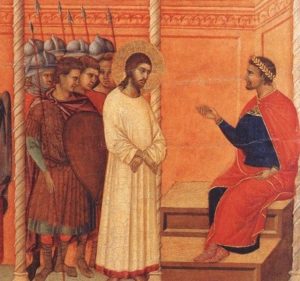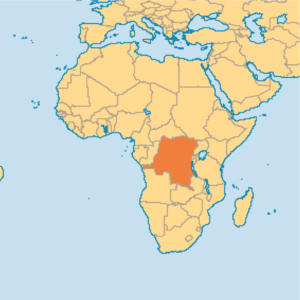GIDEON and THE WEAPONS OF OUR WARFARE
As we read through the Bible, we learn more about the instrumentality of those who are faithful in their obedience, trust, and availability to the revealed will of God.
Gideon is an ordinary farmer, a man of passions, fears, lusts, vindictiveness, and zeal. Despite his many sins, through his humble obedience and availability to the One who called him, Gideon becomes instrumental in delivering the Israelites from the oppression of the Midianites.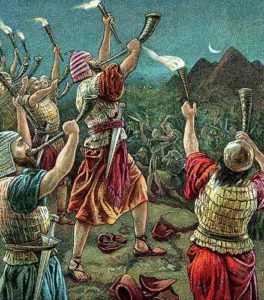
The Living God went to great lengths to encourage him, giving him signs, giving the enemy a dream, and assuring Gideon with words promising him victory (Judges 6:17-21; 36-40; 7:9-15).
The enemy (Midianites and Amalekites) had been warned of their overthrow by the Israelites in a dream one man had of a loaf of barley bread rolling into the camp and overturning and flattening their tent.
A friend interpreted the dream:
“This is nothing less than the sword of Gideon the son of Joash, a man of Israel; God has given Midian and all the camp into his hand.”
Ironically, there is no record that Gideon and his army of a mere 300 had any swords at all. “The sword of Gideon” was the Living Word, the LORD GOD, his Savior. His weapons were not carnal. They were mighty through God for the pulling down of strongholds (2 Cor 10:4).
What were their real weapons?
- Their identification with the Word of God by faith (7:16). The 300 elected men were divided into three companies. According to the dream given to the enemy, they would come upon the Midianites and Amalekites as “one loaf” (7:13). Gideon had been told that they would attack the enemy as “one man” (6:16). They were three units but acting as one, a holy ‘echad’, a composite community of oneness, imaging the Trinity (1 Cor. 10:17).
- Their identification with the Holy Spirit. The dream given to the enemy was that Gideon’s army was one barley loaf. The Feast of Pentecost is the celebration of the harvest of firstfruits. The first harvest is barley. The giving of the Holy Spirit to the church occurred at Pentecost (Acts 2). Barley is not esteemed as highly as wheat in the eyes of men, but here, in the divine economy, its worth is demonstrated due to its identification with the power of the Holy Spirit. Gideon did not look like much, but he was a man who was clothed from on high with the Holy Spirit (6:34).
- Their Brokenness. Each man was to hold empty pitchers with burning lights inside them. When given the signal, they all were to follow Gideon’s example and break the vessel and reveal the light. The impact of each light through each man’s broken vessel would appear from a distance to be the lights of an innumerable multitude, signaling to the enemy that they were surrounded by troops that outnumbered them.
The apostle Paul speaks of light shining through brokenness. Brokenness signifies the submission of our own wills to the will of the Lord:
2 Corinthians 4:6-12 For God, who said, “Light shall shine out of darkness,” is the One who has shone in our hearts to give the Light of the knowledge of the glory of God in the face of Christ. [7] But we have this treasure in earthen vessels, so that the surpassing greatness of the power will be of God and not from ourselves; [8] we are afflicted in every way, but not crushed; perplexed, but not despairing; [9] persecuted, but not forsaken; struck down, but not destroyed; [10] always carrying about in the body the dying of Jesus, so that the life of Jesus also may be manifested in our body. [11] For we who live are constantly being delivered over to death for Jesus’ sake, so that the life of Jesus also may be manifested in our mortal flesh. [12] So death works in us, but life in you.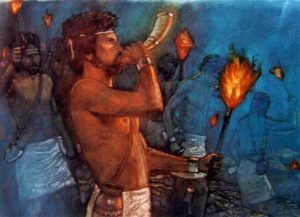
- The Word of their Testimony. The torches were held in each man’s left hand, while the trumpets were held in each man’s right hand. Each man would blow the trumpet. From a distance, the enemy would perceive that each trumpet represented a full battalion of men coming against them. The trumpets herald the gospel of Christ, which announces the defeat of the enemy.
Rev. 12:10-11 Then I heard a loud voice in heaven, saying, “Now the salvation, and the power, and the kingdom of our God and the authority of His Christ have come, for the accuser of our brethren has been thrown down, he who accuses them before our God day and night. [11] “And they overcame him because of the blood of the Lamb and because of the word of their testimony, and they did not love their life even when faced with death.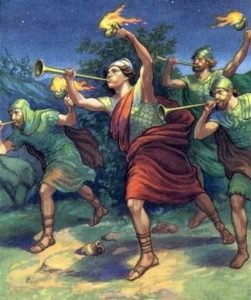
- The Obedience of their Faith. This was the God-given strategy. They were to put their trust in the Word of the Lord. They were to look to Gideon and do exactly what they saw Gideon do (7:17).
Jesus had the same modus operandi. He only did what He saw (understood) the Father was doing.
John 5:19 Therefore Jesus answered and was saying to them, “Truly, truly, I say to you, the Son can do nothing of Himself, unless it is something He sees the Father doing; for whatever the Father does, these things the Son also does in like manner.
This is the victory that overcomes the world- faith in Christ.
1 John 5:4-5 For whatever is born of God overcomes the world; and this is the victory that has overcome the world—our faith. [5] Who is the one who overcomes the world, but he who believes that Jesus is the Son of God?
Gideon’s army won the battle with no sword in hand. The enemy soldiers would turn on themselves and destroy each other with their own swords.
It reminds us of Jesus’ words to Pilate when Pilate asked if he was a king.
John 18:36 Jesus answered, “My kingdom is not of this world. If My kingdom were of this world, then My servants would be fighting so that I would not be handed over to the Jews; but as it is, My kingdom is not of this realm.”
This speaks of the “other-worldliness” of the believer’s victory.
The believer’s weapon is the Sword of the Spirit (Eph 6:17).
Hebrews 4:12 For the word of God is living and active and sharper than any two-edged sword, and piercing as far as the division of soul and spirit, of both joints and marrow, and able to judge the thoughts and intentions of the heart.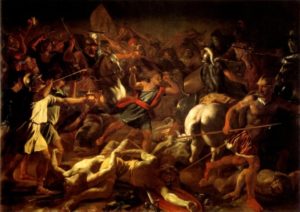
The weapons of our warfare are not carnal. We experience brokenness in our lives, so we are no longer going our own way, doing our own thing for our own glory. Our will is submitted to God’s will. Our daily experiences of death to self, our brokenness, becomes the means whereby the light of His life within us can shine and be multiplied. The effect will be the undoing of the works of the devil.
Our trumpets cannot boast in anything other than Christ crucified, risen, and coming again. We do not hold on to the things of this world. We love not our Adamic life that was judged in Jesus’ death for us on the cross. For us to live is Christ. Let us trumpet that message. Our obedience and holding fast to the Word of God can be a sword for the Lord and for the other Gideons we are called to assemble with.
Although Gideon is an example of how God can use ordinary sinners, such as ourselves, he is no role model. As mentioned earlier, Gideon is not a type here of the Savior. He is a picture of a recipient of God’s grace through faith.
You will notice the absence of any reference to the Lord leading Gideon in his further pursuit of the enemy.
The Israelites wanted to make Gideon their ruler (king). Gideon refused to rule and also pledged that his son, Jether, would not rule. But Gideon did request that each one give him a gold earring from the spoil they had taken from the Ishmaelites. Gideon made an ephod out of the gold, and the Israelites soon made it an object of worship. It proved to be a snare to Gideon and his family (Judges 8:22-27).
When good things are put in the place of the Ultimate and receive a greater allegiance from us than what we give to God, they become idols. What things are in danger of becoming idols in your life?
Gideon’s defeat of the Midianites brought 40 years of peace. In contrast to the revelation he received when the Lord made Himself known to Gideon as YAHWEH SHALOM” (the “Lord is peace”), all humanly negotiated peace arrangements prove to be short-lived.
THE FIFTH APOSTASY (The REIGN OF ABIMILECH) begins in Judges 8:33
After Gideon’s death, the Israelites return to the worship of Baal. In this fifth cycle of deliverance, the judge raised up, Abimelech, was evil.
Gideon was sexually promiscuous and had more than seventy sons by wives and concubines. Gideon’s son by a slave girl, Abimelech, conspires with his mother’s relatives at Shechem to rule over Israel and kills his seventy half-brothers with the exception of the youngest one, Jotham, who escaped.
Jotham boldly proclaims a parable for the people of Shechem from Mount Gerizim (where God’s promised blessings upon the obedient were once proclaimed).
He calls them to obedience: “Listen to me that God may listen to you” (9:7).
The earth is the Lord’s, and the Lord is the King over it. The trees, however, set out to have someone else rule over them. So, they bowed down to inquire whether the olive tree (Gideon) should rule over them. The olive tree recognized that it was not created to wave over other trees but to produce olives and thereby bring pleasure to God and man.
The invitation then went to the fig tree (Jether) and the vine (other sons of Gideon). Each gave similar answers. The fig tree and the vine are national symbols of Israel.
Having been refused by more worthy trees, the bramble (Abimelech) is now asked to rule. “If you are truly anointing me to rule over you,” the bramble says, “come and take refuge in my shade” (9:15). It should be obvious that a bramble is not suitable to provide protection or shade. The trees should know that it is impossible for a thorn bush or bramble to provide the leadership they need. They are warned that the most obvious result will be that the bramble will be the means of the destruction of the more worthy trees, including the tall cedars of Lebanon.
Jotham boldly prophesies, in Judges 9:19-20:
“If then you have dealt in truth and integrity with Jerubbaal and his house this day, rejoice in Abimelech, and let him also rejoice in you. [20] but if not, let fire come out from Abimelech and consume the men of Shechem and Beth-millo; and let fire come out from the men of Shechem and from Beth-millo, and consume Abimelech.”
Jotham’s warning came true when Abimelech, after reigning for three years, destroyed the city of Shechem (9:45), scattering salt over its ruins, and burning its tower (9:46-49). Abimelech’s skull is cracked by a woman at Thebez, and he asks his own armor-bearer to kill him. A period of 45 years of quietness followed under the lesser judges of Tola and Jair.
NEW TESTAMENT READING- Luke 23:44-24:12
Today we read Luke’s dramatic account of the death, burial, and resurrection of Jesus Christ.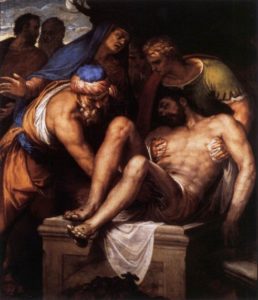
The final three hours when Jesus was hanging on the cross, the whole land was shrouded in darkness. The light from the sun was gone. Suddenly the curtain in the sanctuary was torn in the middle from top to bottom. The perfect offering was being sacrificed so we who are sinners could stand in the perfect righteousness of Christ, the Holiest of All.
The reaction of the crowd at this point had changed to one of deep sorrow.
Luke records that there was a specifically known tomb belonging to Joseph of Arimathea where Jesus was buried. Luke records that his burial was witnessed.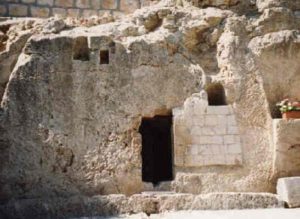
Chapter 24 begins with Luke’s account of the events taking place on the morning of the third day when Jesus rose from the dead. The angels were witnesses of the resurrection and gave their report to the women who came to the tomb. The angels knew the words Jesus had spoken to them earlier in which He prophesied His death and resurrection (Luke 24:7).
When the women went back to tell the disciples what had happened, the disciples did not believe their report. But Peter (and John) ran to the tomb to discover it was empty and that Jesus’ graveclothes had been left behind. This left Peter marveling.
READING FROM THE PSALMS- PSALM 99:1-9
We have a picture of the mercyseat over the ark of the covenant, between the cherubim, as representing the Throne of God. For the believer, the blood of Jesus turns the Judgment Seat into a mercyseat.
Psalm 99:1 (NIV) 1 The LORD reigns, let the nations tremble; he sits enthroned between the cherubim, let the earth shake.
Throughout history, the Lord has proved to be faithful.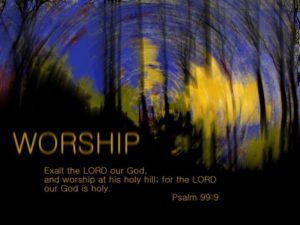
Psalm 99:4 (NASB) 4 The strength of the King loves justice; You have established equity; You have executed justice and righteousness in Jacob.
The Lord has shown His covenant people that He is forgiving, but He also disciplines them when they go wrong.
Notice the threefold recognition of His holiness:
Psalm 99:3 (NASB) 3 Let them praise Your great and awesome name; Holy is He.
Psalm 99:5 (NASB) 5 Exalt the LORD our God And worship at His footstool; Holy is He.
Psalm 99:9 (NASB) 9 Exalt the LORD our God And worship at His holy hill, for holy is the LORD our God.
TODAY’S PROVERB- PROVERBS 14:9
Proverbs 14:9 9 Fools mock at sin, but among the upright there is good will.
Today there are many who make light of sin. They do so at their own peril.
Hebrews 9:27 (NASB) 27 And inasmuch as it is appointed for men to die once and after this comes judgment,
PRAYING FOR THE NATIONS (from the Prayer Guide, “OPERATION WORLD”)
Democratic Republic of Congo (Formally Zaire)
Geography
Area: 2,345,410 sq. km
Congo contains most of the Congo River system and much of the vast Central African rainforest.
Population: 67,827,495 Annual Growth: 2.80%
Capital: Kinshasa
Urbanites: 35.2%
HDI Rank: 176 of 182 (UN Human Development Reports 2009)
Answer to Prayer
The turning to Christ in the 20th Century has been massive. The number of Christians grew from 1.4% of the population in 1900 to over 90% professing Christianity today. Though much of this would be nominal, there have been revivals in some areas before and after independence. Evangelicals have increased 10-fold since 1960.
Challenge for Prayer
The evils of Congo’s tragic history must be overcome through repentance and reconciliation.
a) Arabs and Belgium’s King Leopold II enslaved and looted the country in the 19th Century. The latter’s private empire in Congo probably halved the population, leading to the deaths of 10 million people in 30 years before the Belgian government took over in 1908.
b) Belgian colonial rule and international mining companies exploited Congo’s resources but neglected the people – most of the improvements came through extensive Protestant and Catholic efforts.
c) Interventions by foreign powers and, latterly, African countries often with selfish motives. The West’s propping up of Mobutu’s corrupt regime is, in large part, the cause of the present chaos.
d) Inter-ethnic hostility during the 1990s led to warfare, killings and many fleeing for their lives in Shaba in the south and the Great Lakes in the east and northeast. Hutu and Tutsi ethnic militias, of both Congolese and foreign origin, still roam the Great Lakes region, terrorizing the populace and perpetuating violence, destruction and terror.
The evils of the past need to be admitted, repented of and put right for the Congo to have a viable future. Some Christian groups in Belgium have offered identificational repentance for the predations of their country, a positive development.
PRAYER: Your Word is true, O Lord, and Jesus is risen, just as He said. We pray that we will serve You this day in the power of His resurrection and not succumb to cycles of failure as in the period of the Judges rule. We serve a king who forever finished the work and defeated our foe. In Him we are more than conquerors because His victory is secure. Help us to boldly proclaim His victory and live it out! In Jesus’ Name. Amen.
-Pastor David
So, naturally, we proclaim Christ! We warn everyone we meet, and we teach everyone we can, all that we know about him, so that, if possible, we may bring every man up to his full maturity in Christ. (Colossians 1:28, J.B. Phillips paraphrase)
New Life Community Church, Concord, MA 10742
www.newlife.org

